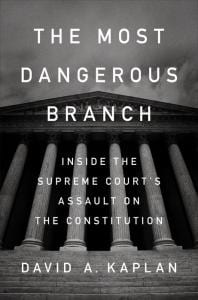By and large I try to leave my professional-ish reviews off of this blog. For the most part, we like Schaeffer’s Ghost to be reviews of movies and books that the wider culture wants to read—or at least should want to read, dang it—and not the stuff of pointy-headed intellectuals. (My writings in that category can be found here and here, among other places.) But every once in a while it can be fun (mostly for me) to bring the two worlds together. Since the Supreme Court is something Christians have been especially interested in since Roe v Wade was passed in 1973, I thought that David Kaplan’s The Most Dangerous Branch: Inside the Supreme Court’s Assault on the Constitution would be an especially worthwhile book to mention here.
In short, Kaplan argues that the United States Supreme Court has become too powerful, too influential, and too involved in the day-to-day business of American government and culture—this especially at the expense of our representative assemblies (i.e. Congress and state legislatures). To which every conservative in the country ought to say “amen.” After all, conservatives have been saying some version of this since Roe in 1973, if not longer. As far as it goes, The Most Dangerous Branch is a useful addition to these sorts of arguments–especially given that this book comes from the Left.

That said, read The Most Dangerous Branch with charity. For those of us on the Right, arguments like “the Supreme Court has too much power” and “the President has functionally become an Emperor” are old hat. For the Left, both of these are new revelations as of November, 2016. It’s telling that this particular book begins not with Roe (though eventually Kaplan goes back as far as Brown v. Board of Education, 1955), but with the death of Antonin Scalia and the eventual appointment of Neil Gorsuch to the Court. It’s hard to escape the conclusion that this book would not have been written had the 2016 election gone the other way…
Still, I think it will be useful for conservatives to read an argument taking their side on this particular issue that is written from the other perspective. And let there be no doubt, it is written from the other perspective. Liberal judges like Kagan, Sotomayor, and RBG are portrayed as bumbling-but-well-intentioned and affable bunglers who just can’t quite see what their limited role should be. Conservative judges like Roberts and Thomas are portrayed as lurking gargoyles just waiting on their moment to strike at the heart of representative democracy. Worst of all, however, is Kennedy:
“But the most important part of Kennedy’s legacy, of course ,was that he chose to skip town for good while Trump was in office, and to do so before the midterm elections that might end GOP control of the Senate.” (pg xiii)
That is a heck of a statement. In one sense, we ought to feel sorry for Anthony Kennedy. He has decisions that are so far all over the place as to be able to infuriate absolutely everybody. Which means that rather than being liked by everybody (which I suspect was at least part of his goal), he ends up being hated by everybody. But to say that, rightly or wrongly, nobody likes Kennedy is not nearly the same thing as saying that “the most important part” of his legacy was his resignation. Should we really forget his decision keeping abortion legal (Planned Parenthood v. Casey, 1992), helping pick a President (Bush v Gore, 2000), legalizing homosexuality (Lawrence v. Texas, 2003), upholding free speech (Citizens United, 2010), or legalizing gay marriage (Obergefell v. Hodges, 2015)? Are we really supposed to think that the most important part of Kennedy’s legacy is that this 82-year-old retired (for partisan reasons?) after serving for thirty years on the Supreme Court?
Again, read this book and be willing to let moments like this wash over you. The Left is new to this idea and is still trying to muddle through the strange (to them) world of a federal government that is out of control and doing things they don’t like it to do. We need to be patient while they figure it all out. The Most Dangerous Branch is a useful step in this direction, and rather than nit-picking at the bits we disagree with, we should encourage this line of thought.
Given the theological nature of this blog, I do have to throw in a final note on Christianity and politics. I’ve been talking about conservative vs. liberal in this review so far. I realize that many Evangelical Christians are going to be politically conservative, and tend towards the “judicial restraint” position. I do want to be clear that while I am a Christian and a believer in judicial restraint, those two things are not the same thing. You can be a perfectly orthodox Christian and have an expansive view of federal power and believe that the role of the Supreme Court is to be active and engaged. Such a view does not require you to comprise your beliefs about the Trinity or atonement or what have you. (Don’t get me wrong, I might question your wisdom, just not your faithfulness.) Hopefully it’s clear why I avoid these issues on this particular site…
Dr. Coyle Neal is co-host of the City of Man Podcast and an Assistant Professor of Political Science at Southwest Baptist University in Bolivar, MO.













